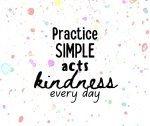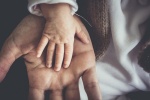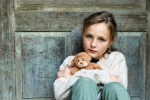
Top 10 Kindful Kids Of 2024
Dear Kindful Kids Community,
 Thank you for being a part of this beautiful journey over the past year, reminding each of us of the beautiful ways that we can nurture the hearts and minds of childen and families. Please reply and share any thoughts or feedback you may have for our team of volunteer editors, so that together we can make 2025 a nourishing one! Wishing you a joyful start to the new year! Thank you for being a part of this beautiful journey over the past year, reminding each of us of the beautiful ways that we can nurture the hearts and minds of childen and families. Please reply and share any thoughts or feedback you may have for our team of volunteer editors, so that together we can make 2025 a nourishing one! Wishing you a joyful start to the new year!
With love and gratitude,
Your Global Kindful Kids Volunteer Editors
(Meghna, Brinda, Neha, Deven and Trishna)
-------------------
Finding Our Way: The Science Of Wayfinding
 Deep within, we have an instinctual capability to find our ways, when we get lost on the road or a building or when we find ourselves in a entirely landmark-free zones. Many indigenous wisdom keepers and Aboriginal communities that originally practiced the art of 'way-finding' continue to rear families with this core tenet. They also nurture these skills in young ones; see more examples in this article and the featured book in the next section. Unconventional to the routinized functioning of contemporary worlds we inhabit, the article advocates getting lost on purpose as a practice of coupling our movement and perception of surrounding contexts. Deep within, we have an instinctual capability to find our ways, when we get lost on the road or a building or when we find ourselves in a entirely landmark-free zones. Many indigenous wisdom keepers and Aboriginal communities that originally practiced the art of 'way-finding' continue to rear families with this core tenet. They also nurture these skills in young ones; see more examples in this article and the featured book in the next section. Unconventional to the routinized functioning of contemporary worlds we inhabit, the article advocates getting lost on purpose as a practice of coupling our movement and perception of surrounding contexts.
The True Power Of A Family Kindness Practice
 Kindness has been in the news a lot lately. Who doesn't love the "be kind" message? It feels good to do good. Intuitively, we know kindness makes our communities stronger. Discovering that it also better prepares our children for a meaningful life, reduces stress, and heightens emotional bonding just makes it better. But we need to go beyond sharing kindness in our news feeds or packing our birthdays with 30-something acts of kindness. We need to make kindness an unavoidable part of family life. As indispensable as brushing teeth. In short, we need to practice. Kindness has been in the news a lot lately. Who doesn't love the "be kind" message? It feels good to do good. Intuitively, we know kindness makes our communities stronger. Discovering that it also better prepares our children for a meaningful life, reduces stress, and heightens emotional bonding just makes it better. But we need to go beyond sharing kindness in our news feeds or packing our birthdays with 30-something acts of kindness. We need to make kindness an unavoidable part of family life. As indispensable as brushing teeth. In short, we need to practice.
The Story That Inspired Me to Be a Better Parent
 "As a pediatrician and host of a parenting & kids’ health podcast, I come across a lot of parenting stories. Some are cute. Some are funny. Many, especially those I encountered personally when I used to work in a hospital, can be heartbreaking. But few stories have ever stopped me in my tracks, leaving me both stunned and inspired, promising myself to strive to be better tomorrow. Until this one.” "As a pediatrician and host of a parenting & kids’ health podcast, I come across a lot of parenting stories. Some are cute. Some are funny. Many, especially those I encountered personally when I used to work in a hospital, can be heartbreaking. But few stories have ever stopped me in my tracks, leaving me both stunned and inspired, promising myself to strive to be better tomorrow. Until this one.”
Grace In The Classroom
 The world of education, especially classroom teaching and the system of assessing students with exams and grades is going through a radical phase of reflection and transformation. This week we'd like to share words of wisdom from a mathematics teacher on the lessons of Grace in teaching and shifting the awareness from weakness to wholeness. He says that "I want to demonstrate to my students that their worthiness does NOT depend on the grades they earn in my class." The world of education, especially classroom teaching and the system of assessing students with exams and grades is going through a radical phase of reflection and transformation. This week we'd like to share words of wisdom from a mathematics teacher on the lessons of Grace in teaching and shifting the awareness from weakness to wholeness. He says that "I want to demonstrate to my students that their worthiness does NOT depend on the grades they earn in my class."
Wholeness Before Happiness
 "Recently I gave a talk to parents about the building blocks of resilience and what they could do at home. I began by saying that in common with most parents when I first held my new-born in my arms I was overwhelmed with feelings of love and protection. I looked down at the sleeping baby and whispered, “I want you to be happy, I will do everything I can to make you happy.” My daughter is now a grown woman and I know now that this wish was not only futile, but also risked overlooking what really mattered. What my child needed was to learn how to be whole, not happy.” "Recently I gave a talk to parents about the building blocks of resilience and what they could do at home. I began by saying that in common with most parents when I first held my new-born in my arms I was overwhelmed with feelings of love and protection. I looked down at the sleeping baby and whispered, “I want you to be happy, I will do everything I can to make you happy.” My daughter is now a grown woman and I know now that this wish was not only futile, but also risked overlooking what really mattered. What my child needed was to learn how to be whole, not happy.”
Walking Each Other Home
 College sophomore Gordon Wayne took a walking journey in August 2020 that spanned over 500 miles from central Virginia to Boston. The purpose was two-fold: to get to school while raising funds for and awareness about homelessness. The year before, he was living out of his car and working 10-hour shifts at a local amusement park. He spent his evenings applying to college. After getting admitted to a local community college, he then got acceptance into his dream school, Boston College, on a full scholarship. Along his walk, he walked 30-40 miles a day over 16 days and raised over $100,000 for National Alliance to End Homelessness. "Every time I want to quit, I just think about the people I'm doing this for and this is bigger than myself and I have to keep going," Wayne told World News Tonight. College sophomore Gordon Wayne took a walking journey in August 2020 that spanned over 500 miles from central Virginia to Boston. The purpose was two-fold: to get to school while raising funds for and awareness about homelessness. The year before, he was living out of his car and working 10-hour shifts at a local amusement park. He spent his evenings applying to college. After getting admitted to a local community college, he then got acceptance into his dream school, Boston College, on a full scholarship. Along his walk, he walked 30-40 miles a day over 16 days and raised over $100,000 for National Alliance to End Homelessness. "Every time I want to quit, I just think about the people I'm doing this for and this is bigger than myself and I have to keep going," Wayne told World News Tonight.
Ten Lessons in Neighborliness & Creating Community
 The headlines are everywhere: Americans have fewer close friends and spend more time online. [...] Working families are exhausted and overwhelmed trying to duct tape all kinds of solutions to systemic problems like the child care crisis and the creep of work expectations into non-work hours. Young people are struggling mightily. It’s enough to make you want to put a blanket over your head and never leave the house. But, in fact, you should do the opposite! Emerge, connect, get your hands in the soil and your feet on the pedals of a bike. You can start by becoming an intentional, committed, and creative neighbor. No matter your housing and neighborhood context, here are 10 lessons for more interdependence and less loneliness. The headlines are everywhere: Americans have fewer close friends and spend more time online. [...] Working families are exhausted and overwhelmed trying to duct tape all kinds of solutions to systemic problems like the child care crisis and the creep of work expectations into non-work hours. Young people are struggling mightily. It’s enough to make you want to put a blanket over your head and never leave the house. But, in fact, you should do the opposite! Emerge, connect, get your hands in the soil and your feet on the pedals of a bike. You can start by becoming an intentional, committed, and creative neighbor. No matter your housing and neighborhood context, here are 10 lessons for more interdependence and less loneliness.
Three Simple Ways For Kids To Grow Their Self-Compassion
 When we practice self-compassion, we treat ourselves with the same kindness that we would offer a friend when things go wrong. This includes soothing ourselves when we struggle and motivating ourselves with kindness. Whereas a habit of self-criticism increases anxiety and depression, adolescents who practice self-compassion become less anxious and depressed. Self-compassion helps kids cope better with challenges and experience more well-being and self-esteem. But just how do we help kids to develop an inner self-compassionate voice? When we practice self-compassion, we treat ourselves with the same kindness that we would offer a friend when things go wrong. This includes soothing ourselves when we struggle and motivating ourselves with kindness. Whereas a habit of self-criticism increases anxiety and depression, adolescents who practice self-compassion become less anxious and depressed. Self-compassion helps kids cope better with challenges and experience more well-being and self-esteem. But just how do we help kids to develop an inner self-compassionate voice?
Why Children Need To Know Their Family History
 Children can make invaluable self-discoveries by being curious about their family histories. Parents, teachers and elders can tend such processes by allowing children to ask questions and being open with them while responding, however mundane, goofy, heroic, joyful or negative the story may feel. Each family carries a unique and vast tapestry; there are ups, downs, and threshold moments. There is no straightforward telling. So what's asked of us is to be more faithful to the diverse parts of the stories, that we haven't yet seen or heard or spoken about. Such conversations allow families (biological or constructed) to be more inclusive of their origins and especially, help children nurture their intergenerational self. Children can make invaluable self-discoveries by being curious about their family histories. Parents, teachers and elders can tend such processes by allowing children to ask questions and being open with them while responding, however mundane, goofy, heroic, joyful or negative the story may feel. Each family carries a unique and vast tapestry; there are ups, downs, and threshold moments. There is no straightforward telling. So what's asked of us is to be more faithful to the diverse parts of the stories, that we haven't yet seen or heard or spoken about. Such conversations allow families (biological or constructed) to be more inclusive of their origins and especially, help children nurture their intergenerational self.
When Children Lose Someone They Love
 With the death of a loved one comes grief — the natural mental, emotional, spiritual, physical and social reaction when a loved one dies. To cope, accept and move forward, kids need time and space in which they can talk about their grief. They also need to develop the resilience to adapt and function despite any change the passing of their loved one has caused in their lives. Building resilience in a young person begins with ongoing connections with adults who care. With the death of a loved one comes grief — the natural mental, emotional, spiritual, physical and social reaction when a loved one dies. To cope, accept and move forward, kids need time and space in which they can talk about their grief. They also need to develop the resilience to adapt and function despite any change the passing of their loved one has caused in their lives. Building resilience in a young person begins with ongoing connections with adults who care.

Kindful Kids newsletter is a resource for parents who are keen to teach children about compassion and service. It reaches 3,919 subscribers. You can unsubscribe here.
|